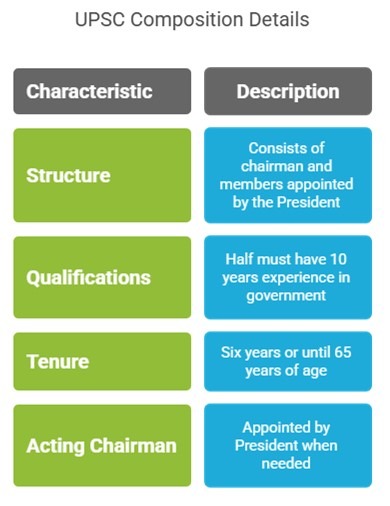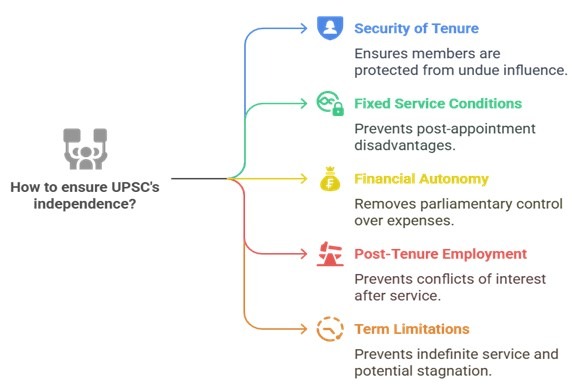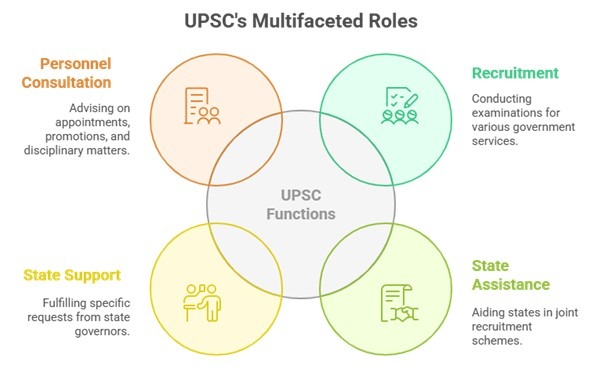Union Public Service Commission (UPSC)
The Union Public Service Commission (UPSC) is a central recruiting agency in India, established as an independent constitutional body to ensure the impartial selection of candidates for civil services. It is governed by Articles 315 to 323 of Part XIV of the Constitution, detailing its composition, powers, and functions.
Composition
- Structure: The UPSC consists of a chairman and other members appointed by the President of India. The exact number of members is not fixed by the Constitution and is left to the President’s discretion. Typically, the UPSC comprises 9 to 11 members, including the chairman.
-
- Qualifications: While no specific qualifications for membership are prescribed, it is required that at least half of the members have served for a minimum of ten years under the Government of India or a state government.
-
- Tenure: Members serve for six years or until they reach the age of 65, whichever is earlier. They may resign at any time by writing to the President, and can be removed before their term ends under specific constitutional provisions.
-
- Acting Chairman: The President can appoint an acting chairman if the office becomes vacant or if the chairman is unable to perform duties. The acting chairman serves until a new chairman is appointed or the original chairman resumes duties.

Removal
The President can remove the chairman or any member of the UPSC under the following conditions:
- Insolvency: If adjudged bankrupt.
- Paid Employment: If they engage in paid employment outside their official duties.
- Unfit Due to Infirmity: If deemed unfit due to mental or physical incapacity.
For allegations of misbehavior, the President must refer the matter to the Supreme Court for an inquiry. The President can remove the individual if the Supreme Court recommends removal based on its findings. The Supreme Court’s recommendation is binding on the President. During such inquiries, the President can suspend the concerned individual.
Misbehavior includes being involved or interested in government contracts or agreements, or profiting from such deals, except as a shareholder in a company.
Independence
To safeguard the UPSC’s independence:
- Security of Tenure: Members have secure tenures, with removal only by constitutional methods.
- Conditions of Service: These are fixed by the President but cannot be altered to a member’s disadvantage post-appointment.
- Financial Autonomy: Expenses are charged on the Consolidated Fund of India, making them not subject to Parliamentary vote.
- Post-Tenure Employment: The chairman is ineligible for other government employment, and members can only become UPSC chairpersons or chairpersons of State Public Service Commissions, with no other roles in government.
- Term Limitations: Members cannot be reappointed to UPSC after serving a term.

These provisions ensure UPSC functions impartially and independently, maintaining the integrity of India’s civil service recruitment process.
The Union Public Service Commission (UPSC) serves as the central recruiting agency for the Indian government, established as an independent constitutional body to ensure merit-based recruitment to civil services.
Functions of the UPSC
The UPSC performs several critical functions, which can be categorized into advisory and administrative roles:
1.Recruitment:
- Conduct examinations for appointments to all-India services, Central services, and public services of centrally administered territories.
2. Assistance to States:
- Assist states in framing and operating joint recruitment schemes if requested by two or more states for positions requiring special qualifications.
3. Support for State Needs:
- Fulfill specific requests from a state governor, with presidential approval, to meet the needs of a state.
4. Consultation on Personnel Management:
- Consulted on matters including:
- Recruitment methods for civil services.
- Principles for appointments, promotions, and transfers.
- Suitability of candidates for appointments and promotions.
- Disciplinary matters affecting civil servants, including:
- Censure and withholding increments or promotions.
- Recovery of financial losses and demotions.
- Removal or dismissal from service.
- Claims for reimbursement of legal expenses for civil servants defending actions taken in their official capacity.
- Claims for pensions regarding injuries sustained while serving.
- Temporary appointments exceeding one year and the regularization of such appointments.
- Extension of service and re-employment of certain retired civil servants.
- Any other related personnel management matters.
- Consulted on matters including:
The Supreme Court has ruled that if the government neglects to consult the UPSC on these matters, public servants have no remedy in court, indicating that failing to consult does not invalidate government decisions. The provisions allow flexibility in the government’s exercise of authority while emphasizing fairness.

In addition, the Parliament can extend UPSC responsibilities to include other services, allowing for broader oversight of the personnel system.
Reporting
The UPSC presents an annual report to the President, who then submits it to both Houses of Parliament along with a memorandum outlining cases where the Commission’s advice was not accepted, requiring approval from the Appointments Committee of the Union Cabinet. Individual ministries cannot independently reject UPSC advice.
Limitations on UPSC Functions
The UPSC is not consulted on certain matters:
1. Reservations: Reservations of appointments or posts for backward classes.
2. Scheduled Castes and Tribes: Consideration of claims for appointments related to these groups.
3. Commissions and Tribunals: Appointments to positions related to commissions or tribunals, and high-ranking diplomatic posts.
4. Temporary Appointments: Selections for temporary or officiating appointments when the individual is not expected to hold the post for more than a year.
The President can exempt certain posts and matters from UPSC jurisdiction, and all regulations made in this regard must be presented before Parliament, where they can be amended or repealed.
Role of UPSC
The UPSC is considered the “watchdog of the merit system” in India. It handles recruitment for all-India services and Central services at the group A and B levels. The Commission advises on promotion and disciplinary issues but is not involved in defining service classifications, pay, or cadre management, which are managed by the Department of Personnel and Training.
UPSC’s recommendations are advisory and not binding on the government, which retains the discretion to accept or reject the advice. The government’s obligation to answer to Parliament for any deviations from UPSC’s recommendations serves as a safeguard for accountability.
The establishment of the Central Vigilance Commission (CVC) in 1964 has also influenced UPSC’s role in disciplinary matters, with both bodies consulted during disciplinary proceedings. Conflicts may arise between the two when their advice differs, but the UPSC retains an edge as an independent constitutional body, while the CVC was created by executive resolution and granted statutory status in 2003.
